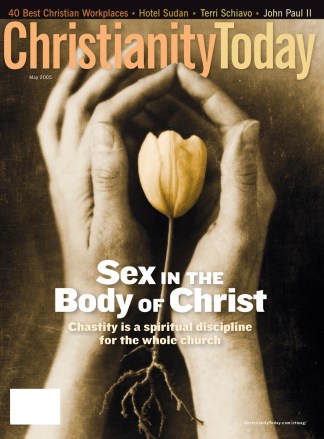Theologians and emergent church leaders across North America are mourning the passing of prolific author and professor Stanley Grenz, 55, who died March 12 after a brain hemorrhage.
“Stan wrote with a gracious style and spirit that invited people into the conversation rather than throwing down gauntlets and pushing people away,” said Maryland pastor Brian McLaren, a leading figure in the emergent movement. “I think that gave him wide influence.”
The author or coauthor of 25 books—including Theology for the Community of God and Rediscovering the Triune God—and hundreds of articles, at his death Grenz was dividing his time between Carey Theological College in Vancouver, British Columbia, and Mars Hill Graduate School, near Seattle.
Mars Hill, which invited Grenz to redesign its master of divinity program before he joined its faculty last fall, quickly established a memorial scholarship fund.
The divinity school also plans to establish a chair of theology in Grenz’s name, president Dan Allender told Christianity Today.
“I think anyone attempting to engage a postmodern culture has been influenced by Stan,” said Allender, one of more than 1,000 mourners who attended his funeral. “I don’t know of a theologian who had a more irenic spirit. He was a deep-hearted, passionate believer.”
Ward Gasque, president of the Pacific Association for Theological Studies in Stanwood, Washington, said Grenz was a good listener. “I believe he was listening both to the questions asked by the younger, emerging leaders and also to the contemporary culture,” Gasque said. “Being secure in his faith, he was not troubled by asking or responding to difficult questions.”
Survived by his wife, Edna, and two children, Grenz was the youngest son of a Conservative Baptist pastor. He held a doctorate from the University of Munich in Germany.
A pastor in several churches, he later taught at five schools in the United States and Canada. He wrote on many subjects, but his attempts to reconcile Christianity with postmodernism attracted the most attention. Author Justin Taylor recently dubbed Grenz as the emergent movement’s theologian.
Grenz’s views earned critics, including some of the evangelical world’s most prominent theologians: Roger Nicole, Millard Erickson, D. A. Carson, and Albert Mohler. Some faulted his scholarship or claimed he overlooked contradictions between postmodernism and the Bible. In a recent Baptist Press column, Union University president David Dockery said Grenz had drifted from historic beliefs by de-emphasizing God’s holiness and the doctrine of Scripture, while elevating community over a so-called “individualistic” approach to salvation. Dockery also lamented that Grenz’s emphasis on piety “did not translate into evangelical coherence or orthodox consistency.”
Noting that Grenz remained gracious in the face of heated criticism, McLaren said some Christians disliked Grenz because he sought new ways of understanding people’s relationship with God.
Gasque said Grenz wanted to take theology from the ivory tower and put it into the marketplace. “Theology is too important to be kept for the academic theologians,” Gasque said. “It must be unleashed for the church at large. Stan did this.”
Copyright © 2005 Christianity Today. Click for reprint information.
Related Elsewhere:
Stan Grenz published this meditation in Christianity Today about learning to trust God in the midst of our anxieties.
Brian McLaren and others have written tributes. Grenz’s website lists several, and has a guestbook for other rememberances.
Other articles by Stan Grenz include:
Drive-Through Christmas | The irony is that in our rush toward Christmas, we truncate the celebration. (Dec. 6, 1999)
Is Hell Forever? | Annihilationists anticipate one ultimate destiny for the wicked, an undifferentiated nonexistence. (Oct. 5, 1998)










